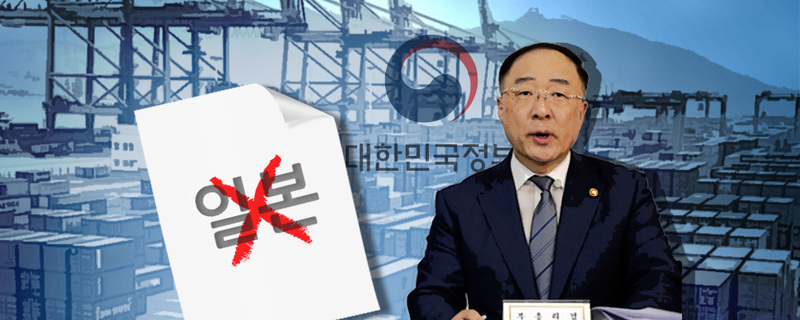Posted on : Aug.3,2019 14:02 KST
Modified on : Aug.5,2019 18:22 KST
Expedited reviews for imports of 1,735 Japanese items to be revoked
The South Korean government has announced that it is removing Japan from its white list of countries receiving simplified export control reviews for strategic goods, while intensifying Japan-related tourism, food, and waste measures. The measures represent a “response in kind” to Tokyo. The government also plans to provide support in the areas of information, finance, and R&D for affected businesses and devise tax benefits while loosening environmental and labor-related regulations.
After Japan made its decision on the morning of Aug. 2 to remove South Korea from its white list, the South Korean government held an ad hoc Cabinet meeting presided over by President Moon Jae-in that afternoon to discuss response measures, which were subsequently announced. The announcement was made at the Central Government Complex in Seoul by Deputy Prime Minister and Minister of Economy and Finance Hong Nam-ki, with Minister of Trade, Industry and Energy Sung Yun-mo, Minister of SMEs and Startups Park Young-sun, Financial Services Commission Chairman Choi Jong-ku, and First Vice Minister of Foreign Affairs Cho Sei-young in attendance.
The government’s plan is to remove Japan from its “A” region, which corresponds to the Japanese white list. In accordance with its Foreign Trade Act and Public Notice on Trade of Strategic Items, South Korea groups together 29 countries that have entered four major international trade control regimes – including the Wassenaar Arrangement – into an “A” region, with favorable treatment including simplified export reviews extended for 1,735 strategic items exported to those countries. Explaining that Japan is to be “placed in a newly created ‘C’ region” apart from the “A” and “B” regions, Minister of Trade, Industry, and Energy Sung Yun-mo said the “items receiving intensified controls and the level of intensification for ‘C’ region countries will be provided early next week when we announce the government’s countermeasures in greater detail.”
The government did not announce which concrete intensified measures it would be adopting against Japan in the areas of tourism, food, and waste. Hong stated that there was a “plan to be announced at a later date.” Analysts said the administration may be raising the specter of measures connected in some ways with Japan’s nuclear accident in 2011, as with its restriction of seafood imports from the Fukushima region. Hong announced that Seoul would be “further speeding up its preparations to take the case against Japan before the WTO.”
“We will also be more actively pursuing our outreach efforts to date with major countries and international organizations,” he said.
Supporting businesses impacted by trade dispute
The administration also said it had prepared countermeasures for impacted businesses. By the government’s calculations, 159 of 1,194 Japanese strategic items stand to be affected by Japan’s removal of South Korea from its white list. The administration announced plans for customized and closely coordinated response measures including the designation of the items as subject to “management,” with extended storage times within bonded areas and exemptions on surtaxes for importation report delays. It also said it would be providing support toward active R&D and facility investment efforts in the material, component, and equipment areas, including tax breaks (such as credits and reduced tariffs), looser environment regulations, and relaxed restrictions on the 52-hour workweek cap.
“We plan to reduce procedures in the environmental area so that factories that are currently being built or expanded can be finished more quickly,” Hong explained. Also to be announced early next week are plans for remedying unfair aspects of the ecosystem between large and small businesses, which have been cited as a factor inhibiting the growth of small businesses in the material, component, and equipment areas.
Meanwhile, the South Korean government dismissed as “misguided” Japanese Minister of Economy, Trade and Industry Hiroshige Seko’s argument the same day that the South Korean government needed to “remedy announcements in the wake of the Tokyo briefing on July 12 that are contrary to the facts or in violation of agreements.”
Sung explained, “At the time, the South Korean government was demanding a full restoration, which was a stronger measure than a withdrawal.”
“The two sides were at odds with Japan proposing only a partial announcement and South Korea insisting that everything had to be announced in detail, and in the end they gave individual briefings without reaching an agreement,” he said.
By Choi Ha-yan, staff reporter
Please direct comments or questions to [english@hani.co.kr]









